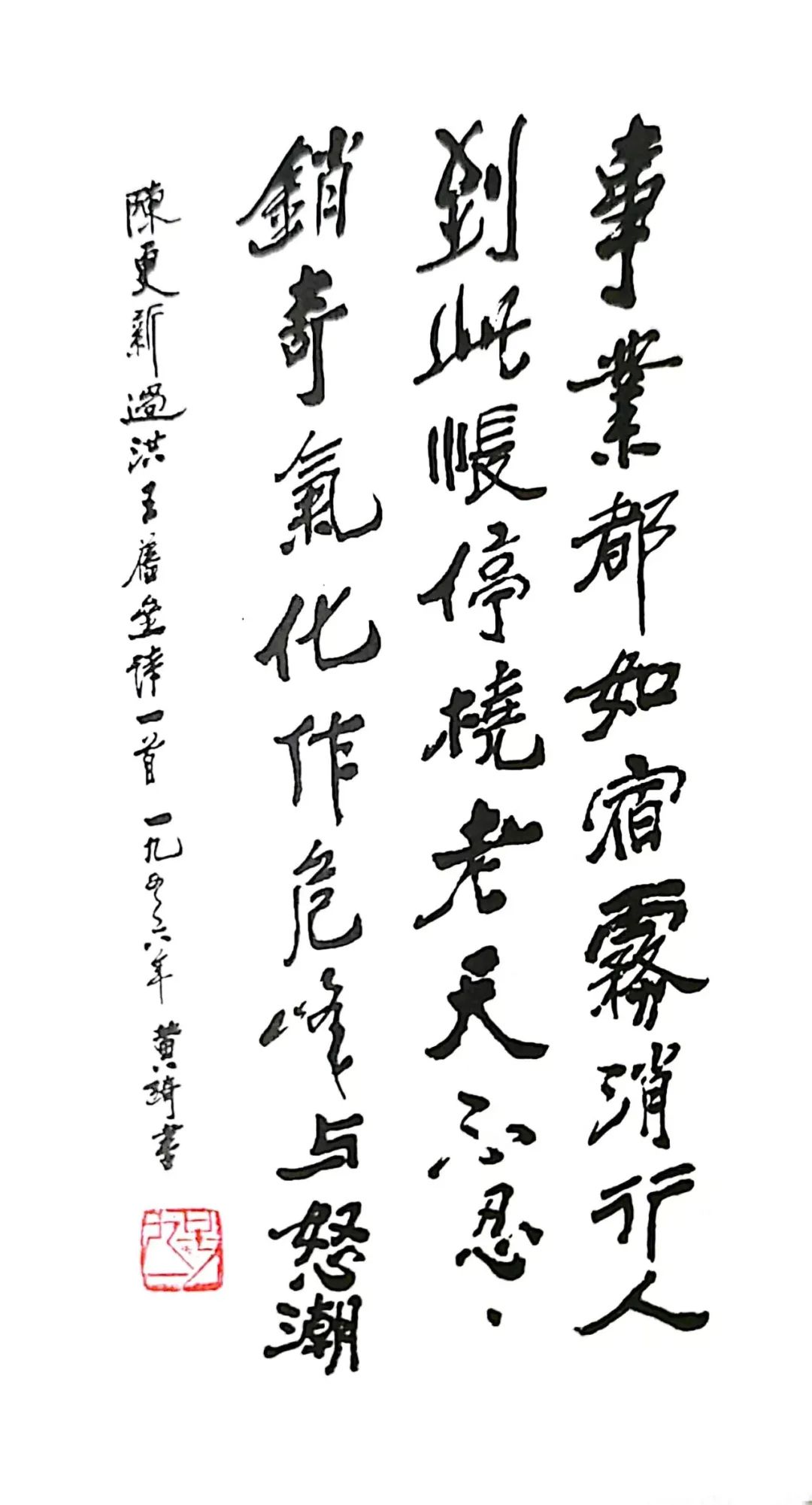编者按:2021年,为实现党建联动区域化、促进党史教育机制化,上海外国语大学与上海龙华烈士陵园举办签约共建仪式,开展建党百年、百+共建专题活动,引导广大青年在学思践悟中传颂先辈故事、坚定理想信念。上外英院龙陵青年志愿服务队从译介角度进行实践。继人物篇和文物篇后,“龙陵x英华青年说”现推出第三季故事篇,继续讲演中国共产党人的革命故事,积极推广文化译介新理念,助力红色文化“走出去”。

图为陈更新《过洪王旧垒》,黄绮书
(摘自《龙华碑苑诗文赏析》)
朗诵者:2022级硕士生钱亭伽
过洪王旧垒——唯有精神永恒
Eternal Spirit: Passing by Ancient Fortresses of King Hong
过洪王旧垒
陈更新
事业都如宿雾消,
行人到此怅停桡。
老天不忍销奇气,
化作危峰与怒潮。
Passing by Ancient Fortresses of King Hong
Chen Gengxin
All great causes have faded away like overnight mists,
Passers-by stop paddling here, full of melancholy.
The Lord of Heaven could not bear to lose such noble spirits,
And thus transformed them into steep mountains and raging tides.
【作者简介】
陈更新(1889~1911),福建侯官人。著名的黄花岗七十二烈士之一。早年留学日本,回国后参加革命,1911年广州起义失败后,他被捕牺牲。
【Introduction of the author】
Chen Gengxin (1889-1911), who was from Houguan County, Fujian, was one of the famed Seventy-two Martyrs of Huang Hua Mound. He studied abroad in Japan in his early years and participated in the revolution after returning to China. He was arrested and executed following the failure of the Guangzhou Uprising in 1911.
【注释】
1、洪王——指太平天国领袖洪秀全。1851年他领导太平军在广西桂平金田村起义,建立了太平天国。1853年攻克南京,自称天王。
2、旧垒——旧时的营垒。
3、怅——惆怅、失意。
4、桡——船桨,这里代指船。
5、危——高,陡。
【Notes】
1. 洪王 (hongwang): King Hong, also Hong Xiuquan (1814–1864), led the Taiping army to revolt against the Qing dynasty and established the Taiping Heavenly Kingdom (1851–1864) in Jintian Town, Guiping, Guangxi in 1851. In 1853, he captured Nanjing and proclaimed himself as “Heavenly King”.
2. 旧垒(jiulei): Ancient fortresses.
3. 怅(chang): A feel of melancholy; sadly.
4. 桡(rao): Paddles, referring to boats in this context.
5. 危(wei): High and steep.
【赏析】
唯有精神永恒
这首诗作于1911年,当时作者去广西桂林看望一位朋友,路过太平天国的旧营——桂平与武宣之间的鹏化山,这是当年洪秀全成立上帝会、传播革命思想的地方。作者身处此境,深有感触,于是写下了这首七言绝句。
Only the Spirit is Eternal
The poem was written in 1911 when Chen went to visit a friend in Guilin, Guangxi, and passed by the Penghua Mountain situated between Guiping and Wuxuan. It was the former site of Taiping Heavenly Kingdom (1851–1864), the place where Hong Xiuquan (1814–1864) founded the God Worshipping Society and spread revolutionary ideas. With his feelings all stirred up, Chen wrote this seven-character quatrain.
这首诗可分为前后两段,前半段是怀念洪王旧事,后半段是抒发自己的情怀。“事业都如宿雾消,行人到此怅停桡。”轰轰烈烈的太平天国起义纵横十八省,为时十四年,是我国历史上规模最大的农民革命运动。但这场如火如荼的革命早已像隔夜大雾、过眼云烟,荡然消尽了。路过的行人到了这里都会停船追溯,怅然若失。“老天不忍销奇气,化作危峰与怒潮。”老天若有情,绝不会忍心目睹英雄们的失败,而是将他们这种气壮山河的豪情化成高山和激浪。作者在这里借“老天”来表达自己的情感,他是替太平天国的英雄们惋惜,他们虽然失败了,但他们的精神永恒,那“危峰”和“怒潮”就是他们精神的象征,就是他们英雄气概的见证。
The poem can be divided into two sections: the first half is in memory of the old days of Hong Xiuquan, the King of Taiping Heavenly Kingdom. The second half expresses the sentiments of Chen himself.
All great causes have faded away like overnight mists,
Passers-by stop paddling here, full of melancholy.
The Taiping Rebellion spread to 18 provinces and lasted 14 years, making it the largest peasant uprising in Chinese history. However, this great revolution failed and disappeared like overnight mists and fleeting clouds. Remembering this, passers-by would stop their boats here and feel a lasting loss in heart.
The Lord of Heaven could not bear to lose such noble spirits,
And thus transformed them into steep mountains and raging tides.
The benevolent Lord of Heaven will never let the heroes’ great spirits fade away but will turn them into grand mountains and strong waves. Here Chen expressed his feelings through the voice of God. He lamented for the heroes in the Taiping Heavenly Kingdom. Despite the failure, their glorious purpose would last forever, which is witnessed by the “steep mountains” and “raging tides” in this quatrain.
读这首诗,感觉就好像是一位英雄在为另一群英雄唱赞歌,一切都会过去,唯有精神不死。作者自己就是这样一位具有如此精神力量的英雄。几个月后,他参加了广州起义。失败后,孤身奋战,终因弹尽力竭而被俘。临刑时清朝官吏问他为什么要“倡乱”,他答到:“我为了唤醒同胞的迷梦而起义,怎么说是‘倡乱’?杀身成仁,正是古人的明训。”说罢,仰天大笑,从容就义。
The poem is presented as a hymn by a hero for the heroes who he respected. Everything shall pass, but the spirit is eternal. Chen was also a hero with such great strength. A few months after completing this poem, he participated in the Guangzhou Uprising. After the failure of the cause, he fought alone and was unfortunately captured due to the exhaustion of food and ammunition. Before his execution, the Qing officials asked him why he joined this “malicious” rebellion. He replied, “I devote myself to this glorious revolution to awaken the deceived Chinese. How can you call it ‘malicious’? To die for a noble cause has always been righteous since ancient times.” After that, he burst out laughing, and then met his death with great composure.
跋文:陈更新《过洪王旧垒》诗一首,一九九六年,黄绮书。
黄绮(1914~2005),江西修水人。中国书协名誉理事,河北书协主席。此篇书体为行书。
Passing by Ancient Fortresses of King Hong by Chen Gengxin, handwritten by Huang Qi, 1996.
Huang Qi (1914-2005), who is from Xiushui County, Jiangxi, is Honorary Director of China Calligraphers Association and Chairman of Hebei Calligraphers Association. The calligraphy style of the work is semi-cursive.
我要评论 (网友评论仅供其表达个人看法,并不表明本站同意其观点或证实其描述)
全部评论 ( 条)